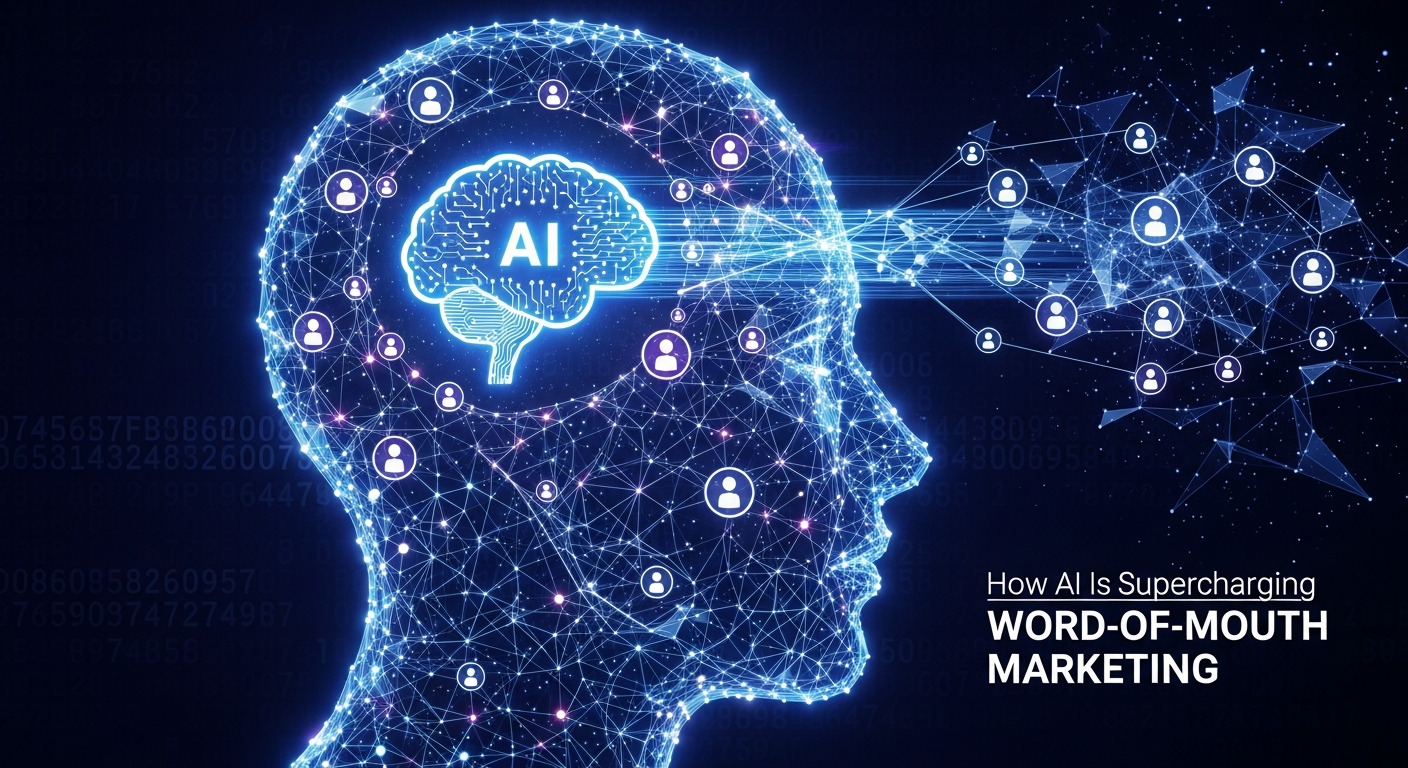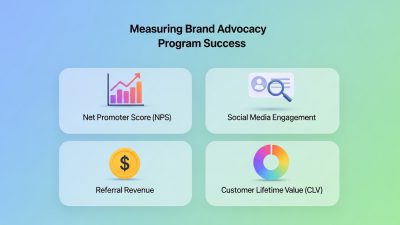Word-of-mouth marketing remains one of the most trusted and effective forms of promotion. While artificial intelligence is transforming how brands understand, scale, and optimise customer advocacy, it does not replace human connection. Instead, AI enhances word-of-mouth by providing deeper insights, personalization, and efficiency, allowing brands to build trust-driven relationships at scale
Word-of-mouth marketing has always been the gold standard for building trust. A recommendation from a friend carries more weight than any flashy advertisement. For decades, this powerful form of marketing relied on genuine, human-to-human interaction. But as artificial intelligence continues to reshape every aspect of our lives, from how we work to how we shop, what happens to this deeply personal marketing channel?
Many marketers are wondering if AI will render traditional word-of-mouth obsolete. Will algorithms and automated messages replace authentic conversations? The answer is more nuanced than a simple yes or no. Instead of replacing word-of-mouth, AI is set to amplify it, creating new opportunities for businesses to foster genuine connections at an unprecedented scale.
Understanding the New Wave of Word-of-Mouth
At its core, word-of-mouth marketing (WOM) is straightforward: a satisfied customer shares their positive experience with someone else. This organic form of promotion is rooted in trust and authenticity, making it especially powerful in influencing consumer decisions. Unlike paid advertising, which audiences may approach with scepticism, word-of-mouth feels genuine because it is driven by real experiences and personal connections.
The rise of social media platforms, online forums, and review websites has significantly expanded the reach of these personal recommendations. What once took place in private conversations can now occur on a global scale, where individual opinions are transformed into lasting digital endorsements. Likes, shares, comments, and reviews allow customers to influence purchasing decisions far beyond their immediate networks, increasing both the speed and impact of word-of-mouth communication.
Now, artificial intelligence is introducing another layer to this evolution. AI’s ability to process and analyse massive amounts of data enables businesses to gain deeper insights into customer sentiment, preferences, and behaviour. It helps identify influential advocates, track emerging conversations, and personalise communication on a highly granular level. As a result, organisations can take a more sophisticated and data-driven approach to nurturing word-of-mouth, strengthening customer relationships while preserving the authenticity that makes WOM so effective
How AI Is Supercharging Word-of-Mouth Marketing

Artificial intelligence is no longer just a futuristic concept; it is a practical and accessible tool that brands can use today to enhance their word-of-mouth strategies. By integrating AI into their marketing efforts, businesses can move from passively hoping that customers will recommend them to adopting a more active, intentional, and strategic approach. This shift allows brands to better understand their audiences, strengthen relationships, and amplify authentic customer advocacy.
Identifying and Empowering Brand Advocates
One of the biggest challenges in word-of-mouth marketing has always been identifying who your most passionate and influential customers, often referred to as brand advocates, truly are. While loyal customers exist across every brand, they are not always easy to spot. AI-powered sentiment analysis tools help solve this problem by scanning social media conversations, online reviews, forums, and even customer support interactions to pinpoint individuals who consistently express positive sentiment toward your brand.
-
Sentiment Analysis: By analysing the language, tone, and emotional cues within customer feedback, AI can distinguish between a casually satisfied customer and a genuine brand evangelist. This deeper understanding makes it possible to uncover advocates who may not have a large following but whose enthusiasm and credibility make their recommendations highly persuasive.
-
Engagement Tracking: AI can also track engagement metrics across multiple platforms to identify users who frequently interact with your content, share brand-related posts, or recommend your products organically. These individuals demonstrate consistent interest and involvement, making them far more likely to champion your product or service within their own networks.
Once identified, these advocates can be empowered through exclusive content, early access to new products, loyalty rewards, or personalised thank-you messages. Such recognition not only strengthens their connection to the brand but also encourages them to continue spreading positive word-of-mouth in an authentic and enthusiastic way.
Personalising Customer Experiences at Scale
Generic marketing messages increasingly fall flat in a crowded digital landscape. Today’s customers expect experiences that reflect their individual needs, preferences, and behaviours. AI enables brands to deliver this level of personalisation at scale, creating meaningful interactions that foster emotional connection and increase the likelihood of customers sharing their positive experiences with others.
-
Personalised Recommendations: AI algorithms, similar to those used by platforms like Netflix and Amazon, can analyse a customer’s purchase history, browsing behaviour, and preferences to suggest products they are genuinely likely to enjoy. When a recommendation feels accurate and timely, it enhances satisfaction and becomes a powerful catalyst for word-of-mouth.
-
Customised Communication: AI can also tailor email campaigns, chatbot interactions, and website content to individual users. Addressing customers by name, referencing past purchases or interactions, and anticipating their needs demonstrates attentiveness and care. This personalised approach makes customers feel valued rather than targeted, increasing trust and long-term loyalty.
By combining intelligent data analysis with human-centred communication, AI allows brands to create personalised experiences that naturally inspire customers to talk about them—amplifying word-of-mouth while maintaining its authenticity.
Optimizing for Voice and Answer Engines

The way people search for information is rapidly evolving. Voice assistants such as Alexa, Google Assistant, and Siri, along with AI-powered search engines, are increasingly designed to provide direct, concise answers rather than long lists of search results. As users rely more on spoken queries and conversational searches, this shift is creating a new frontier for word-of-mouth marketing known as Answer Engine Optimization (AEO).
For a brand to become the answer, its content must be clear, accurate, and authoritative, while directly addressing the questions customers are most likely to ask. Information needs to be structured in a way that is easy for both humans and AI systems to interpret, prioritising clarity, relevance, and trustworthiness. AI tools can play a critical role here by analysing search patterns, identifying frequently asked questions, and revealing how customers naturally phrase their queries.
Beyond identifying questions, AI can also help optimise how content is organised—suggesting concise responses, structured data, and conversational language that voice assistants and answer engines favour. When your brand consistently appears as the definitive source of information, it strengthens credibility and positions your business as a trusted expert in its field. This authority builds confidence among users, encouraging them to recommend your brand to others and share their positive experiences, naturally amplifying word-of-mouth in an increasingly AI-driven search environment.
Streamlining and Enhancing Referral Programs
Referral programs represent a more structured and intentional form of word-of-mouth marketing, turning customer advocacy into a measurable and repeatable strategy. When designed well, they reward loyal customers for sharing their positive experiences while helping brands acquire new customers through trusted recommendations. AI can significantly enhance the effectiveness of these programs while also making them easier and more efficient to manage.
- Automated Rewards: AI can automate the entire referral process, from tracking who referred whom to distributing rewards accurately and in real time. By ensuring that both the referrer and the new customer receive their incentives promptly, AI removes friction and reduces the risk of errors or delays. This seamless and transparent experience increases trust in the program and encourages more customers to participate and refer others.
- Predictive Analytics: AI can analyse historical data and ongoing performance metrics to identify patterns in referral behaviour. It can predict which incentives are most appealing, which channels drive the highest-quality referrals, and which customers are most likely to recommend your brand. These insights allow businesses to continuously optimise their referral programs, adjusting rewards and messaging to maximise engagement and long-term impact.
By combining automation with intelligent insights, AI transforms referral programs into dynamic, data-driven systems that scale efficiently while preserving the authenticity and trust that make word-of-mouth marketing so effective.
The Human Element: Why Authenticity Still Matters
While AI offers powerful tools to scale your marketing efforts, it’s crucial to remember that word-of-mouth is fundamentally about human connection and trust. An over-reliance on automation can make your brand feel impersonal and robotic, undermining the very authenticity you’re trying to foster.
The most successful brands will be those that utilize AI to enhance, rather than replace, the human touch. Utilize AI to automate repetitive tasks and gather insights, but empower your team to leverage that information to foster genuine relationships. A personalized email is great, but a handwritten thank-you note or a direct message from a real person can have a much greater impact. The future of word-of-mouth marketing lies in striking a perfect balance between technological efficiency and genuine human interaction.
Preparing for the Future of Marketing

The integration of AI into word-of-mouth marketing is not a distant trend; it’s happening right now. To stay competitive, businesses need to start adapting their strategies today.
Begin by exploring AI-powered tools for sentiment analysis and customer data management. Focus on using these tools to better understand your customers and identify your most passionate advocates. From there, you can start personalizing your communication and optimizing your content for the new era of AI-driven search.
By embracing AI as a partner in your marketing efforts, you can develop a more efficient, effective, and authentic word-of-mouth strategy that drives sustainable growth for years to come.
Conclusion
AI is reshaping word-of-mouth marketing, not by removing its human essence, but by amplifying it. Brands that successfully integrate AI while preserving authenticity will be best positioned to earn trust, encourage genuine recommendations, and drive sustainable growth. The future of marketing belongs to those who combine intelligent technology with real human connection.
To learn more about building strong brand advocates, check out this resource: The Complete Guide to Building a Brand Advocacy Program
Frequently Asked Questions (FAQs)
1. What is word-of-mouth marketing (WOM)?
Word-of-mouth marketing (WOM) is a form of marketing where customers share their personal experiences with a brand, product, or service with others. These recommendations can happen through face-to-face conversations, social media posts, online reviews, or referrals. Because WOM is based on real experiences rather than paid promotion, it is widely considered one of the most credible and influential marketing strategies.
2. Why is word-of-mouth considered more trustworthy than advertising?
Word-of-mouth is considered more trustworthy because it comes from people consumers already know or respect, such as friends, family members, or peers. Unlike traditional advertising, which is often viewed with scepticism due to its promotional nature, WOM feels authentic and unbiased. This trust makes recommendations more persuasive and more likely to influence purchasing decisions.
3. Does AI replace traditional word-of-mouth marketing?
No, AI does not replace traditional word-of-mouth marketing. Instead, it enhances and amplifies it. AI provides insights, automation, and scalability, but the core of word-of-mouth—human trust and personal experience—remains unchanged. AI helps brands support and nurture these conversations rather than replacing genuine human interaction.
4. How does AI enhance word-of-mouth marketing?
AI enhances word-of-mouth marketing by analysing large volumes of customer data to identify trends, sentiment, and influential advocates. It allows brands to personalise communication, optimise referral programs, and identify opportunities to encourage positive conversations. By using AI strategically, businesses can scale WOM efforts while maintaining authenticity.
5. What is sentiment analysis in marketing?
Sentiment analysis is an AI-driven technique that evaluates customer feedback to determine emotional tone—positive, neutral, or negative. By analysing reviews, social media posts, and customer interactions, brands can understand how customers truly feel about their products or services. This insight helps identify loyal advocates and address potential issues early.
6. How can AI identify brand advocates?
AI identifies brand advocates by analysing engagement patterns, sentiment, and behavioural data across multiple platforms. Customers who consistently leave positive feedback, interact frequently with brand content, and recommend products organically are flagged as potential advocates. This allows brands to recognise and reward their most passionate supporters.
7. Why is personalisation important for word-of-mouth marketing?
Personalisation makes customers feel understood and valued, which strengthens emotional connections with a brand. When experiences feel tailored to individual needs and preferences, customers are more likely to share those positive experiences with others. AI enables this level of personalisation at scale, increasing the likelihood of organic recommendations.
8. What role do voice assistants play in modern marketing?
Voice assistants like Alexa, Google Assistant, and Siri are changing how users search for information by providing direct, spoken answers. This shift makes it important for brands to optimise content for voice search and conversational queries. When a voice assistant recommends a brand as the answer, it acts as a powerful form of digital word-of-mouth.
9. What is Answer Engine Optimization (AEO)?
Answer Engine Optimization (AEO) focuses on structuring content so that AI-driven search engines and voice assistants can easily identify and deliver direct answers to user questions. Instead of ranking pages, AEO aims to make a brand the single best answer. This visibility builds authority, trust, and long-term brand credibility.
10. How does AI improve referral programs?
AI improves referral programs by automating referral tracking, reward distribution, and performance analysis. It ensures that incentives are delivered accurately and on time while also identifying which rewards and customer segments perform best. This data-driven optimisation increases participation and referral success.
11. Can automation harm brand authenticity?
Yes, excessive automation can harm authenticity if it replaces genuine human interaction. Customers can quickly sense when communication feels robotic or impersonal. The key is to use AI to support and enhance human engagement, not to replace it entirely. Balance is essential to maintaining trust.
12. How can brands balance AI and human interaction?
Brands can balance AI and human interaction by using AI for data analysis, automation, and insights while keeping relationship-building human-led. AI can handle repetitive tasks and personalization, but meaningful engagement—such as personal messages, customer support, and community interaction—should involve real people. This balance ensures efficiency without sacrificing authenticity.





